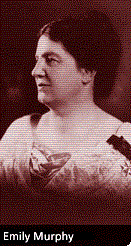 |
| Emily Murphy |
Everybody's heard about the first man on the moon, the man who first invented the light bulb and all the other people who did something first.
But there's one person out there who almost no one has heard of. She was the first woman Magistrate in the British Empire. The one who fought to make women legal persons. Though not well known, Emily Murphy is a very important person in the fight for women's rights.
She was born Emily Ferguson in 1868 Cookstown in Ontario. Emily was part of a legal family, with three brothers who became lawyers, a grandpa who was an M.P. and her grandpa's cousin who was a Supreme Court judge. So it was no surprise to her family that Emily was interested in law.
When Emily turned 15 she went to Bishop Strachan School in Toronto. At 19, she married an Anglican Minister named Arthur Murphy. In 1903, Mrs. Murphy started a campaign for women's property rights, allowing a married woman to one third of her husband's property. The law was passed by the Alberta Legislature in 1911. But the real battle didn't begin until the year of 1916.
It all started when Emily and a few other women tried to attend a trial and were kicked out of the courtroom because it was said that trials were not “fixed for mixed company.” After this incident, Murphy decided that there should be a court for women, presided over by women. The minister agreed and Emily became the first woman Magistrate in the British Empire. Still, people argued that under the British North American Act of 1867, a woman was not a legal person. Obviously very offended by this statement, Emily sought a way to change this. After much searching, she found a part in the Supreme Court Act that said five willing people could petition. Mrs. Murphy picked four close friends to petition with her: Nellie McClung, Louise McKinney, Henrietta Edwards and Irene Parlby. They took the "Persons Case" to the Supreme Court of Canada in 1928, where women were ruled against. Emily had already struggled for 12 long years and was not prepared to give up. She was determined that things could change, so Emily and her four friends went to the Privy Council in Britain.
Finally, all of Emily Murphy's work paid off. On October 18, 1929, women were officially declared legal persons. Emily resigned as Magistrate in 1930 and passed away on October 27, 1933, at the age of 65.
Emily Murphy is a hero to me because she fought to change something that she knew was wrong. And even when people tried to stop her, she kept pushing until the wrong became the right. So although she's not well known, Emily Murphy will always be remembered as a hero for changing Canadian women's lives for the better.
Page created on 9/3/2011 12:00:00 AM
Last edited 9/3/2011 12:00:00 AM
